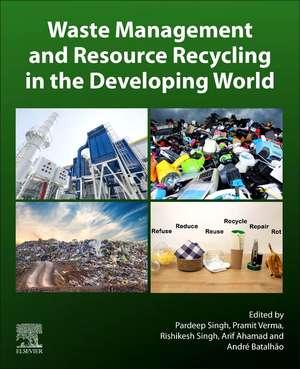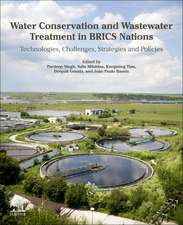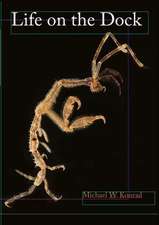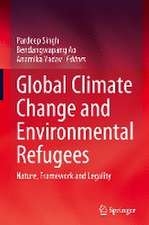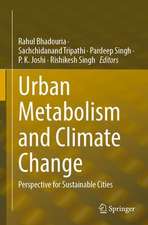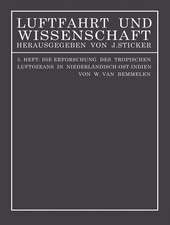Waste Management and Resource Recycling in the Developing World
Editat de Pardeep Singh, Pramit Verma, Rishikesh Singh, Arif Ahamad, André C. S. Batalhãoen Limba Engleză Paperback – 9 dec 2022
There is high potential for waste management to produce energy and value-added products. Sustainable waste management based on a circular economy not only improves sanitation, it also provides economic and environmental benefits. In addition to waste minimization, waste-to-economy and waste-to-energy have become integral parts of waste management practices. A proper waste management strategy not only leads to reduction in environmental pollution but also moves toward generating sufficient energy for improving environmental sustainability in coming decades.
- Presents case studies in every section to illustrate practical applications across the globe
- Includes lessons learned from developed regions that can be applied to developing regions
- Organized by type of waste, with consistent coverage in each section to promote ease of navigation
Preț: 735.02 lei
Preț vechi: 949.94 lei
-23% Nou
Puncte Express: 1103
Preț estimativ în valută:
140.66€ • 152.74$ • 118.16£
140.66€ • 152.74$ • 118.16£
Carte tipărită la comandă
Livrare economică 16-30 aprilie
Livrare express 18-22 martie pentru 111.17 lei
Preluare comenzi: 021 569.72.76
Specificații
ISBN-13: 9780323904636
ISBN-10: 0323904637
Pagini: 870
Dimensiuni: 191 x 235 x 49 mm
Greutate: 1.47 kg
Editura: ELSEVIER SCIENCE
ISBN-10: 0323904637
Pagini: 870
Dimensiuni: 191 x 235 x 49 mm
Greutate: 1.47 kg
Editura: ELSEVIER SCIENCE
Public țintă
Environmental Scientists and Engineers working in waste management and sustainability Secondary audience: Chemical engineers working in waste management and sustainabilityCuprins
1. Waste generation in Brazil: municipal, agricultural and industrial wastes
2. Generation of Waste: Problem to Possible Solution in Developing and Underdeveloped Nations
3. Use of participatory methodologies to improve the Urban Solid Waste Management System in Cape Verde – Sal Island
4. Waste Characterization in Brazil
5. E-Waste Management– Sources, Strategies, Impacts and Consequences
6. Translational Transport of E-Waste and implications on human well beings and the environment
7. Electronic (e-waste) Conduct: Chemical assessment and treatment methods
8. Biological methods for the treatment of e-waste
9. Chemical Methods for the treatment of e-waste
10. E-Waste Management Using Different Cost-Effective, Eco-friendly Biological Techniques: An Overview
11. Life cycle assessment of e-waste management: Current practices and future research agenda towards sustainability
12. E-waste: Policies and Legislations for a sustainable green growth
13. E-waste policies and implementation: a global perspective
14. The future of e-waste in the circular economy of Ghana: Implications for urban planning, environmental and human health risks
15. The role of the informal sector on e-waste management: a case study from Brazil
16. Recent Perspectives of Nanoparticles in Industrial Waste Management-an overview
17. Advances in industrial waste management
18. Nano- and microplastics in the environment: a potential threat to in-situ bioremediation of wastewaters
19. Biological Methods For The Treatment Of Industrial Waste
20. Adsorptive Removal Of Hazardous Dyes From Industrial Waste Using Activated Carbon: An Appraisal
21. Hazardous waste management lessons from developed countries
22. Hazardous biomedical waste management scenario of the developing countries
23. Chemical methods for the treatment of biomedical hazardous waste
24. Advances in Biomedical waste management technologies
25. Biological treatment of pharmaceutical wastes
26. Municipal solid waste management, its fate and waste-to-energy in the context of a developing economy like India
27. Applications of waste-to-economy practices in urban water sector: Implications for Environmentaland Human health
28. Cost-benefit analysis act as a tool for evaluation of waste to the economy: A synthesis
29. Conversion of waste materials into different by-products of economic value
30. Vermicomposting – the sustainable Solid Waste Management
31. Sustainability Of Biorefineries For Waste Management
32. Municipal solid waste management in Brazil: overview and trade-offs between different treatment technologies
33. Waste management practices in a developing nation: Challenges and opportunities
2. Generation of Waste: Problem to Possible Solution in Developing and Underdeveloped Nations
3. Use of participatory methodologies to improve the Urban Solid Waste Management System in Cape Verde – Sal Island
4. Waste Characterization in Brazil
5. E-Waste Management– Sources, Strategies, Impacts and Consequences
6. Translational Transport of E-Waste and implications on human well beings and the environment
7. Electronic (e-waste) Conduct: Chemical assessment and treatment methods
8. Biological methods for the treatment of e-waste
9. Chemical Methods for the treatment of e-waste
10. E-Waste Management Using Different Cost-Effective, Eco-friendly Biological Techniques: An Overview
11. Life cycle assessment of e-waste management: Current practices and future research agenda towards sustainability
12. E-waste: Policies and Legislations for a sustainable green growth
13. E-waste policies and implementation: a global perspective
14. The future of e-waste in the circular economy of Ghana: Implications for urban planning, environmental and human health risks
15. The role of the informal sector on e-waste management: a case study from Brazil
16. Recent Perspectives of Nanoparticles in Industrial Waste Management-an overview
17. Advances in industrial waste management
18. Nano- and microplastics in the environment: a potential threat to in-situ bioremediation of wastewaters
19. Biological Methods For The Treatment Of Industrial Waste
20. Adsorptive Removal Of Hazardous Dyes From Industrial Waste Using Activated Carbon: An Appraisal
21. Hazardous waste management lessons from developed countries
22. Hazardous biomedical waste management scenario of the developing countries
23. Chemical methods for the treatment of biomedical hazardous waste
24. Advances in Biomedical waste management technologies
25. Biological treatment of pharmaceutical wastes
26. Municipal solid waste management, its fate and waste-to-energy in the context of a developing economy like India
27. Applications of waste-to-economy practices in urban water sector: Implications for Environmentaland Human health
28. Cost-benefit analysis act as a tool for evaluation of waste to the economy: A synthesis
29. Conversion of waste materials into different by-products of economic value
30. Vermicomposting – the sustainable Solid Waste Management
31. Sustainability Of Biorefineries For Waste Management
32. Municipal solid waste management in Brazil: overview and trade-offs between different treatment technologies
33. Waste management practices in a developing nation: Challenges and opportunities
